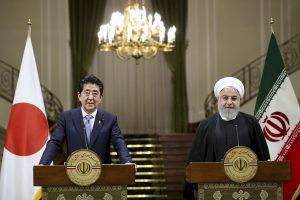The situation in the Middle East remains extremely unstable. Since May 2019, when Iran declared that it was suspending some of its commitments under the Joint Comprehensive Plan of Action (JCPOA), Saudi Arabian and Norwegian registered oil tankers have been attacked around the Straits of Hormuz, and a Japanese oil tanker was attacked while Prime Minister Shinzo Abe was actually visiting Iran. September brought a strike on a Saudi Arabian oil facility, knocking out 5 percent of global oil production, albeit temporarily. For Japan, relying as it does on the Middle East for its supply of crude oil and natural gas, the frequent occurrence of such dangerous situations poses a major problem for domestic energy security.
Moreover, the facts and intentions pertaining to these incidents are not clear. Iran is suspected of involvement in the May and June oil tanker attacks and the September attack on the oil facility, but denies any such involvement. Saudi Arabia and the United Arab Emirates also hinted at Iran’s involvement, but did not hold Iran to account for the damage sustained. The United States has meanwhile pointed the finger directly at Iran. However, Washington’s existing policy of “maximum pressure” on Iran leaves little scope for sanctions. Even if additional sanctions were to be imposed, it would not significantly change the situation.
Amid these events, the United States formed a coalition called the Maritime Security Initiative, which aims at providing security within the Persian Gulf by strengthening its military presence. However, apart from countries such as the UK, which had an oil tanker seized by Iran, and Saudi Arabia, a longtime Iran foe, few countries have responded to this initiative.
Heavily reliant on the United States for security, rendering it vulnerable to U.S. pressure, Japan believes that responding to U.S. expectations in some way is beneficial for its own security. Iran, however, is wary of a U.S.-led coalition and is strongly opposed to US intervention. Japan has maintained friendly relations with Iran since the 1979 Iranian Revolution, and in June Abe became the first sitting Japanese prime minister to visit Iran in 40 years. As far as possible, Abe would like to avoid participating in a coalition that could negatively affect Japan’s relations with Iran. Indeed, Iranian President Hassan Rouhani announced a visit to Japan, which will coincide with the latter’s decision on whether to deploy SDF vessels to the Middle East.
Another factor is Article 9 of the Japanese Constitution, in which Japan renounces war. Even if deployed, the Japan Self-Defense Forces are heavily constrained in what they can do. The use of weapons is limited to cases of self-defense, or situations where there is a threat to the national survival of Japan, or – specific to this scenario – where a Japanese registered tanker is in danger and such danger cannot be averted without the use of weapons. However, Japanese-registered tankers are not the only tankers that transport crude oil into Japan, and there could be legal and political repercussions to protecting foreign-registered tankers.
As a way to meet these requirements without participating in the coalition, the Japanese government is considering the deployment of Japan Maritime Self-Defense Force (SDF) vessels for “investigation and research” to the area from the Gulf of Oman to the Arabian Sea and the Bab el-Mandeb Strait, without entering the Persian Gulf. The deployment of vessels for the purpose of “investigation and research” represents a compromise. It shows a willingness to contribute to Washington’s initiative without getting directly involved, avoiding a parliamentary debate over the use of weapons. At the same time, it avoids provoking Iran by steering clear of the Persian Gulf.
Since the fruit of this compromise is the deployment of SDF vessels, it would most likely be impossible to protect oil tankers heading for Japan. However, since U.S. President Donald J. Trump’s last-minute cancellation of a retaliatory attack on Iran following its downing of a U.S. military drone in June, the situation in the Persian Gulf has become more settled. The attack on the Saudi Arabian oil facility in September may have been timed to coincide with Saudi Aramco’s IPO rather than being aimed at tankers passing through the Straits of Hormuz. Iran has proposed the Hormoz Peace Endeavor (HOPE), and the UAE and other countries are seeking to improve relations.
So it is possible that Japanese tankers will be safe even if Japan does not deploy SDF vessels. However, if the SDF takes action that transcends the scope of “investigation and research” in response to a provocation by Iran or an over-reaction on the part of the United States, this delicately balanced compromise will fail. Avoiding this will require a foreign policy that takes great care to ease tensions in the Persian Gulf.
Kazuto Suzuki is a professor of International Politics at the Public Policy School of Hokkaido University.

































